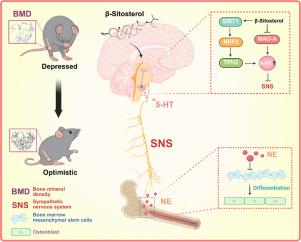神经-骨骼串扰:脑源性5-羟色胺介导β-谷甾醇对绝经后骨质疏松症的骨保护作用。
IF 8.3
1区 医学
Q1 CHEMISTRY, MEDICINAL
引用次数: 0
摘要
背景:绝经后骨质疏松症(PMOP)常伴有抑郁,其潜在的神经-骨骼相互作用尚不清楚。血清素和交感神经系统(SNS)活动与情绪和骨骼调节有关。目的:探讨β-谷甾醇(βS)是否通过调节中枢5-羟色胺(5-HT)合成和SNS活性来缓解pmp相关性抑郁和骨质流失。设计:使用小鼠模型和细胞分析进行体内和体外研究的整合。方法:用βS治疗卵巢切除小鼠(OVX)和5- ht缺陷小鼠。采用行为评估、微ct、免疫组织化学、酶联免疫吸附试验(ELISA)、Western blotting (WB)和分子对接来评估抗抑郁作用、骨骼参数和相关信号通路。体外,在PC12细胞和骨髓间充质干细胞中评估βS对5-HT生成和成骨的影响。结果:βS通过激活SIRT1/NRF2/TPH2通路,抑制MAO-A,促进脑5-羟色胺合成。它减轻了OVX和5- ht缺陷小鼠的抑郁样行为,降低了SNS活动,并防止了骨质流失。体外,βS通过条件培养基增加PC12细胞5-HT分泌,促进骨髓间充质干细胞成骨分化。结论:βS通过促进5- ht介导的SNS活性抑制来恢复神经骨骼稳态,从而改善情绪和骨骼健康。这些发现确定βS是治疗PMOP合并症和抑郁症的有希望的候选药物。我们的研究首次提供了将植物甾醇治疗与骨质流失中的神经骨骼调节联系起来的证据。本文章由计算机程序翻译,如有差异,请以英文原文为准。

Neuro-skeletal crosstalk: Brain-derived 5-HT mediates the bone-protective effects of β-Sitosterol against postmenopausal osteoporosis
Background
Postmenopausal osteoporosis (PMOP) is frequently accompanied by depression, and the underlying neuro-skeletal crosstalk remains unclear. Serotonin and sympathetic nervous system (SNS) activity are implicated in both mood and bone regulation.
Objective
To investigate whether β-sitosterol (βS) alleviates PMOP-associated depression and bone loss through modulation of central 5-hydroxytryptamine (5-HT) synthesis and SNS activity.
Design
An integration of in vivo and in vitro studies using mouse models and cellular assays.
Methods
Ovariectomized (OVX) and 5-HT-deficient mice were treated with βS. Behavioral assessments, micro-CT, immunohistochemistry, enzyme-linked immunosorbent assays (ELISA), Western blotting (WB), and molecular docking were employed to evaluate antidepressant effects, bone parameters, and related signaling pathways. In vitro, βS effects on 5-HT production and osteogenesis were assessed in PC12 cells and BMSCs.
Results
βS enhanced brain 5-HT synthesis by activating the SIRT1/NRF2/TPH2 pathway and suppressing MAO-A. It alleviated depressive-like behaviors, reduced SNS activity, and prevented bone loss in both OVX and 5-HT-deficient mice. In vitro, βS increased 5-HT secretion in PC12 cells and promoted osteogenic differentiation in BMSCs via conditioned media.
Conclusion
βS restores neuro-skeletal homeostasis by boosting 5-HT-mediated suppression of SNS activity, thereby improving mood and bone health. These findings identify βS as a promising candidate for treating comorbid PMOP and depression. Our study provides the first evidence linking phytosterol therapy to neuro-skeletal regulation in bone loss.
求助全文
通过发布文献求助,成功后即可免费获取论文全文。
去求助
来源期刊

Phytomedicine
医学-药学
CiteScore
10.30
自引率
5.10%
发文量
670
审稿时长
91 days
期刊介绍:
Phytomedicine is a therapy-oriented journal that publishes innovative studies on the efficacy, safety, quality, and mechanisms of action of specified plant extracts, phytopharmaceuticals, and their isolated constituents. This includes clinical, pharmacological, pharmacokinetic, and toxicological studies of herbal medicinal products, preparations, and purified compounds with defined and consistent quality, ensuring reproducible pharmacological activity. Founded in 1994, Phytomedicine aims to focus and stimulate research in this field and establish internationally accepted scientific standards for pharmacological studies, proof of clinical efficacy, and safety of phytomedicines.
 求助内容:
求助内容: 应助结果提醒方式:
应助结果提醒方式:


